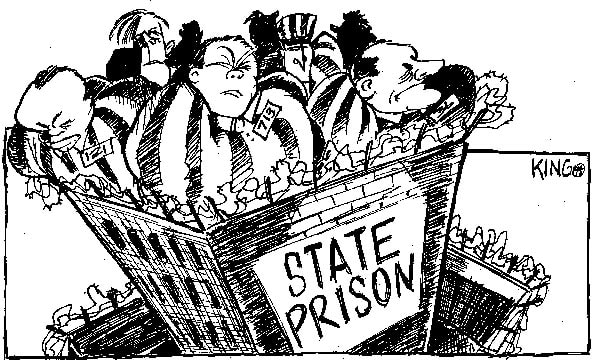
Prosecutors don’t get promoted by offering shorter sentences
Like many Americans, I follow criminal justice developments closely. The arrest and coming prosecution of Sean Combs, also known as P. Diddy, among other things, will likely remain in the headlines for months, and perhaps years, and promises to be fascinating. Prosecutions related to the January 6, 2021, riots at the Capitol remain ongoing. And the Justice Department has been making good use of the previously largely ignored Foreign Agents Registration Act to pick low-hanging fruit criminal cases against people whose politics they don’t like, such as journalist, whistleblower and former United Nations weapons inspector Scott Ritter.
It also occurred to me that most Americans have no idea how federal sentences are determined. The methods of determining them are myriad. First, most judges do not have much say in the length of sentences. There are “sentencing guidelines,” which give judges a limited range in which to issue a sentence after receipt of a “sentencing recommendation” from an investigator with the U.S. Marshals Service, there are “mandatory minimums,” and there are “statutory maximums.” More ominously, and little understood by the public, there are “sentencing enhancements.” These are triggers that can make sentences longer, even if it is simply for declaring one’s innocence. And, as with just about everything, there are exceptions. Let me explain.
First, take a look at the sentencing guidelines. The chart has “Offense Levels,” under which every crime falls, listed from 1 to 43. Level 1 is something akin to jaywalking on federal property. The recommended sentence is 0-6 months in jail. Level 43 is something akin to carrying out the September 11 attacks. That can result in either life in prison or the federal death penalty. The sentencing guideline chart also has something called “criminal history categories I through VI.” If you have never committed a crime before, or if you have committed one minor crime, you would be a Category 1. On the other side, if you are a career criminal with many felony convictions, you would be a Category VI. You will see in a moment how this can impact an eventual sentence.
As an example, let’s say that John Doe has been convicted in a federal court under 21 U.S.C. 841 (b)(1)(A). That is the crime of “Unlawful manufacturing, importing, exporting, or trafficking of drugs.” Furthermore, a person to whom John Doe sold the drugs died of an overdose. The sentencing guidelines call for an offense level of 26. That means, with no previous convictions, a sentence of between 63-78 months. (All federal sentences are denoted in months.) If John Doe had committed crimes in the past, the sentence could be anywhere from 70 to 137 months. And if John Doe were a career criminal, the same crime could be as long as 150 months.
All of that is before “enhancements,” however, and there are a lot of them. If John Doe had a gun (even if he had not used it during the commission of the crime), that would be an enhancement of two levels, bringing that 63-78 month recommendation to 78-97 months. If the drug confiscated during the arrest was methamphetamine, that would be another two-level enhancement, bringing the recommended sentence to 97-121 months. And if John Doe used a computer to sell his drugs, that is yet another two-level enhancement, bringing the recommended sentence to 121-151 months. And if John Doe were to—gasp—take advantage of his constitutional right to request a jury trial, that is, unbelievably, another two-level enhancement, something that the Justice Department calls “failure to accept responsibility.” That makes the sentence 151-188 months. That is quite a difference from 63-78 months. It’s no wonder that the prisons are full to bursting.

I mentioned earlier that everything is open to negotiation. And that is why, according to ProPublica, the government wins 98.2% of its cases, almost all as a result of plea bargains. Who would want to face years, or even decades, in prison, when you can negotiate a deal and get a significantly shorter sentence?
And ask yourself this: How many innocent people plead guilty because they do not want to roll the dice in front of a jury and risk those decades in prison? After all, it is no secret that virtually every prosecutor sees himself or herself one day running for Congress or for governor, becoming the U.S. Attorney, or getting a corner office in an A-list law firm. They will not get promoted or be considered for those positions by not prosecuting you. They do not get ahead in life by offering you a shorter sentence.
With the largest incarceration rate in the world, we Americans have given ourselves a draconian and heavy-handed sentencing regime. It is not something to be proud of. It screams out for reform. But who has the guts? How many House or Senate candidates will go out on the campaign trail and say, “I want to make prison sentences shorter!” I can’t think of any.

CovertAction Magazine is made possible by subscriptions, orders and donations from readers like you.
Blow the Whistle on U.S. Imperialism
Click the whistle and donate
When you donate to CovertAction Magazine, you are supporting investigative journalism. Your contributions go directly to supporting the development, production, editing, and dissemination of the Magazine.
CovertAction Magazine does not receive corporate or government sponsorship. Yet, we hold a steadfast commitment to providing compensation for writers, editorial and technical support. Your support helps facilitate this compensation as well as increase the caliber of this work.
Please make a donation by clicking on the donate logo above and enter the amount and your credit or debit card information.
CovertAction Institute, Inc. (CAI) is a 501(c)(3) non-profit organization and your gift is tax-deductible for federal income purposes. CAI’s tax-exempt ID number is 87-2461683.
We sincerely thank you for your support.
Disclaimer: The contents of this article are the sole responsibility of the author(s). CovertAction Institute, Inc. (CAI), including its Board of Directors (BD), Editorial Board (EB), Advisory Board (AB), staff, volunteers and its projects (including CovertAction Magazine) are not responsible for any inaccurate or incorrect statement in this article. This article also does not necessarily represent the views the BD, the EB, the AB, staff, volunteers, or any members of its projects.
Differing viewpoints: CAM publishes articles with differing viewpoints in an effort to nurture vibrant debate and thoughtful critical analysis. Feel free to comment on the articles in the comment section and/or send your letters to the Editors, which we will publish in the Letters column.
Copyrighted Material: This web site may contain copyrighted material the use of which has not always been specifically authorized by the copyright owner. As a not-for-profit charitable organization incorporated in the State of New York, we are making such material available in an effort to advance the understanding of humanity’s problems and hopefully to help find solutions for those problems. We believe this constitutes a ‘fair use’ of any such copyrighted material as provided for in section 107 of the US Copyright Law. You can read more about ‘fair use’ and US Copyright Law at the Legal Information Institute of Cornell Law School.
Republishing: CovertAction Magazine (CAM) grants permission to cross-post CAM articles on not-for-profit community internet sites as long as the source is acknowledged together with a hyperlink to the original CovertAction Magazine article. Also, kindly let us know at info@CovertActionMagazine.com. For publication of CAM articles in print or other forms including commercial internet sites, contact: info@CovertActionMagazine.com.
By using this site, you agree to these terms above.
About the Author

John Kiriakou was a CIA analyst and case officer from 1990 to 2004.
In December 2007, John was the first U.S. government official to confirm that waterboarding was used to interrogate al-Qaeda prisoners, a practice he described as torture.
Kiriakou was a former senior investigator for the Senate Foreign Relations Committee and a former counter-terrorism consultant. While employed with the CIA, he was involved in critical counter-terrorism missions following the terrorist attacks of September 11, 2001, but refused to be trained in so-called “enhanced interrogation techniques,” nor did he ever authorize or engage in such crimes.
After leaving the CIA, Kiriakou appeared on ABC News in an interview with Brian Ross, during which he became the first former CIA officer to confirm the existence of the CIA’s torture program. Kiriakou’s interview revealed that this practice was not just the result of a few rogue agents, but was official U.S. policy approved at the highest levels of the government.
Kiriakou is the sole CIA agent to go to jail in connection with the U.S. torture program, despite the fact that he never tortured anyone. Rather, he blew the whistle on this horrific wrongdoing.
John can be reached at: jkiriakou@mac.com.










